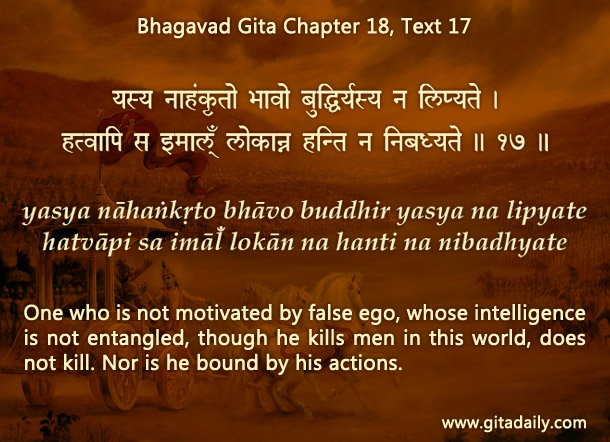“How can one act without being bound?” This is Arjuna’s essential question at the start of the Bhagavad-gita. And the whole Gita addresses it at various progressively higher levels.
While addressing it in its last chapter, the Gita (18.17) asserts provocatively that one without arrogance or attachment may do any activity, even kill, without getting bound. Does this verse give a license for killing?
Arjuna let Krishna enter into him and take center stage in his heart, thereby identifying himself more as a devotee than as a warrior.
No, not at all – it graphically illustrates the philosophical principle that unattached action is un-entangling, a principle that intrinsically has nothing to do with killing. The point is that one can stay karmically safe even while entering into war if one does not let the war into oneself, that is, one doesn’t let the passion, the fury, the frenzy – overall the attachment – associated with war possess oneself.
Significantly, the Gita culminates (18.66) with the best recommendation for karmic safety: surrendered service to Krishna, for he being the Lord of everything including karma can indemnify one from all karmic reaction. Arjuna’s response reveals his consciousness: “I will do your will.” (18.73). Thus his focus is not on fighting but on doing Krishna’s will, which in those specific circumstances happened to be fighting. This shows that he didn’t let the war enter into him. Rather, he let Krishna enter into him and take center stage in his heart, thereby identifying himself more as a devotee than as a warrior.
Like Arjuna, we too may have entangling duties, akin to wars. We can enter them without letting them enter us, that is, we can prevent excessive attachment to them enter into us if we by our devotional disposition let Krishna enter and occupy our heart. Then that focus on serving him will, by his grace, not only protect us from bondage but also lead us to liberation.

Explanation of article:
https://www.youtube.com/watch?v=TeIgb2sp0rc

“…….. thereby identifying himself more as a devotee than a warrior” – the hidden unofficial designation to make our work as worship.Thank you Prabhu for this insight.
Hare Krishna,AGTSP.
Very nice explanation with nice words like ” karmically”I
Very nice explanation !!!